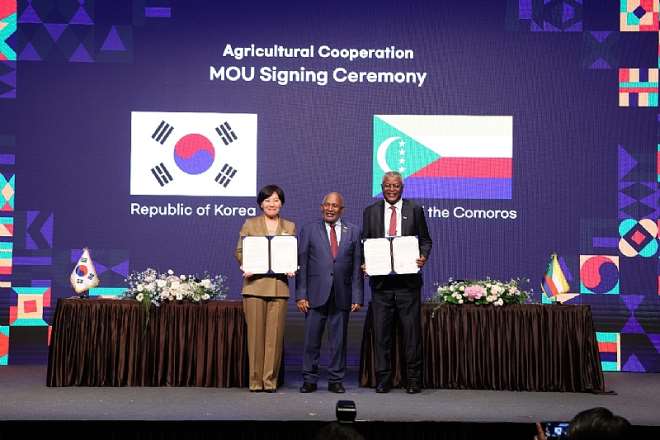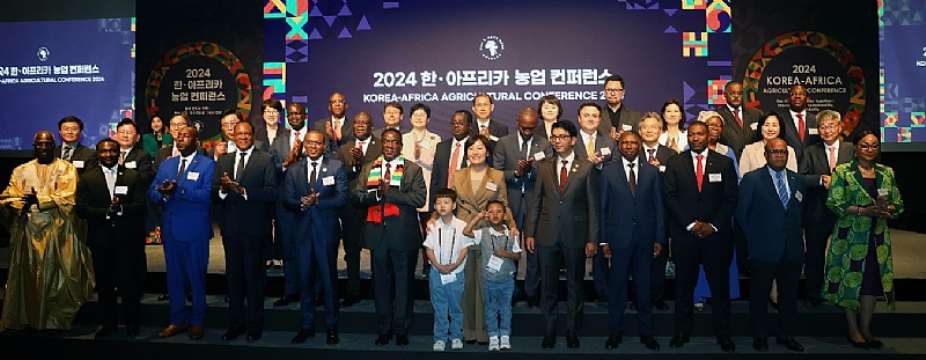Sejong, 6 June 2024 — The Ministry of Agriculture, Food and Rural Affairs (MAFRA) and the Rural Development Administration (RDA) held the Korea-Africa Agricultural Conference on 5 June 2024 in Seoul, under the theme of “The Future We Make Together: Agricultural Unity Across Korea and Africa.” The official side event of the Korea-Africa Summit produced fruitful results to deepen agricultural cooperation between South Korea and Africa.
The event was attended by approximately 300 people, including President Azali Assoumani of the Union of the Comoros, President Andry Rajoelina of the Republic of Madagascar, and President Emmerson Mnangagwa of the Republic of Zimbabwe. The event was also attended by ministers and vice ministers from 10 African countries1); delegations for governments, companies, and civic groups from more than 30 countries; and officials from international organizations2) and journalists and reporters from outside and inside South Korea.
- Minister-level participants came from Angola, the African Union, Comoros, Gambia, Equatorial Guinea, Madagascar, Malawi, Senegal, Sierra Leone, and Zimbabwe; and vice minister-level participants came from Angola and Ghana.
- the African Development Bank Group (AfDB), the Africa Rice Centre (AfricaRice), the Green Climate Fund (GCF), the International Fund for Agricultural Development (IFAD), the UN Food and Agriculture Organization (FAO), and the UN World Food Programme (WFP).
Minister Song Miryung of Agriculture, Food and Rural Affairs said at her welcoming speech: “We hope that we will become a true partner for Africa’s agricultural growth in various fields such as smart farming, rice productivity enhancement, processing of agricultural products, improvement in living conditions in rural agricultural areas, and others.” Presidents of African countries expressed high expectations for South Korea’s agricultural cooperation projects, including the K-Ricebelt project, through their congratulatory speeches.
At an opening ceremony of the Korea-Africa Agricultural Conference, ministers from four African countries—the Republic of Angola, the Republic of Madagascar, the Republic of Malawi, and the Republic of Zimbabwe—signed a Memorandum of Understanding (MoU) on the participation in the K-Ricebelt project with Minister Song Miryung. This additional MoU signing has brought the total number of the K-Ricebelt project participating countries to fourteen. The K-Ricebelt project is an official development assistance (ODA) project aimed to share South Korea’s high-yielding rice seeds and agricultural expertise to increase Africa’s rice productivity. The Union of the Comoros also signed an MoU with the MAFRA, regarding the exchanges of agricultural knowledge and the enhancement of public-private cooperation.
At a presentation and discussion session following the opening ceremony, the ministers from six African countries—the Republic of Equatorial Guinea, the Republic of the Gambia, the Republic of Madagascar, the Republic of Malawi, the Republic of Senegal, and the Republic of Sierra Leone—explained their government’s agricultural policies and emphasized the reasons about the importance of cooperation with South Korea.
In addition, at the session, the MAFRA, the RDA, and the Ministry of the Interior and Safety explained the projects having been carried out through cooperation between South Korea and Africa, including food aid, building of agricultural infrastructure, supply of agricultural machinery, research and development of agricultural technologies, supply of agricultural technologies, Saemaul Undong (New Community Movement), etc. The Korean side also shared with the African side the major achievements made through such projects.
Also, at the session, presentations were made under the topic about challenges for agriculture and rural agricultural areas in Africa and response measures by Dr. Abebe Haile-Gabriel, Assistant Director-General and Regional Representative for Africa of the UN FAO and Dr. Babourcarr Manneh, Director General of AfricaRice. Presentations under the same topic were made as well by officials from international organizations associated with agriculture such as the AfDB, the GCF, the IFAD, and the UN WFP.
Minister Song Miryung said: “Presidents and ministers of African countries participated in the Korea-Africa Agricultural Conference today. And they said they hoped to extend cooperation with South Korea to new areas such as strengthening of agriculture value chains, application of digital technologies to agriculture, and others beyond the current cooperation projects such as the K-Ricebelt project and the KOPIA projects. As I heard this, I realized that Africa’s expectations of agricultural cooperation with South Korea are very high.”
Minister Song added: “I will make the utmost effort to ensure that what have been discussed today at this conference can be developed into more cooperation with Africa, and thereby Korean agriculture can be widely recognized across the world.”
 K-ricebelt Mou Between South Korea And Madagascar
K-ricebelt Mou Between South Korea And Madagascar
 K-ricebelt Mou Between South Korea And Angola
K-ricebelt Mou Between South Korea And Angola
 K-ricebelt Mou Between South Korea And Malawi
K-ricebelt Mou Between South Korea And Malawi
 K-ricebelt Mou Between South Korea And Zimbabwe
K-ricebelt Mou Between South Korea And Zimbabwe
 Agricultural Cooperation Mou Between South Korea And The Comoros
Agricultural Cooperation Mou Between South Korea And The Comoros
At the Korea-Africa Agricultural Conference, presidents of African countries expressed high expectations for South Korea's agricultural cooperation projects. The agricultural conference was attended by approximately 300 people, including presidents from the Comoros, Madagascar, and Zimbabwe. The event was also attended by Africa's ministers and vice ministers; delegations for governments, companies, and civic groups from more than 30 countries; and officials from international organizations and journalists and reporters from outside and inside South Korea. Also, Angola, Madagascar, Malawi, and Zimbabwe signed an MoU on the K-Ricebelt project participation with South Korea. The Comoros also signed an MoU for agricultural cooperation.





 "FSHS is a constitutional injunction; it doesn't need further legislation except...
"FSHS is a constitutional injunction; it doesn't need further legislation except...
 Three dead after Mauritania riots amid post-election tension
Three dead after Mauritania riots amid post-election tension
 Let’s thoroughly investigate to understand how the ownership of 90% shares of Ad...
Let’s thoroughly investigate to understand how the ownership of 90% shares of Ad...
 Give us more space to highlight our successes—Peace Council to media
Give us more space to highlight our successes—Peace Council to media
 Election 2024: Be fair, transparent – Bishop Agyenta tells EC
Election 2024: Be fair, transparent – Bishop Agyenta tells EC
 Sale of SSNIT Hotels: Group calls for immediate termination of deal, not suspens...
Sale of SSNIT Hotels: Group calls for immediate termination of deal, not suspens...
 "Registering your gun not a guarantee to shoot and kill people" — Upper West Reg...
"Registering your gun not a guarantee to shoot and kill people" — Upper West Reg...
 Forestry Commission wants stiffer punishment for forest offenders
Forestry Commission wants stiffer punishment for forest offenders
 Ghana’s population to hit 52.46 million in 2050 — GSS
Ghana’s population to hit 52.46 million in 2050 — GSS
 President Akufo-Addo details four-point agenda to accelerate SDGs implementation
President Akufo-Addo details four-point agenda to accelerate SDGs implementation
